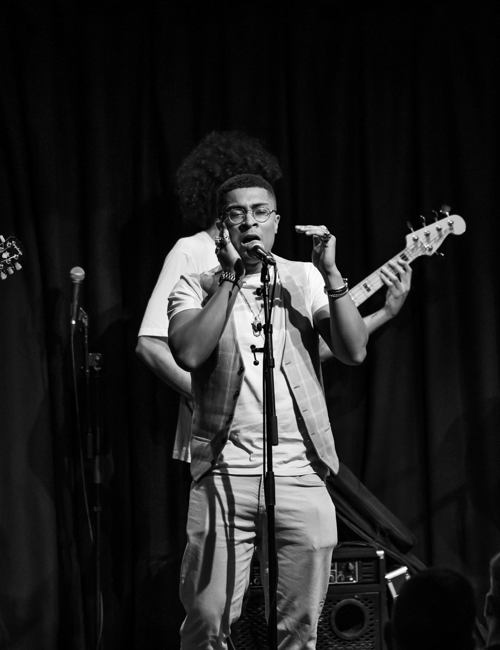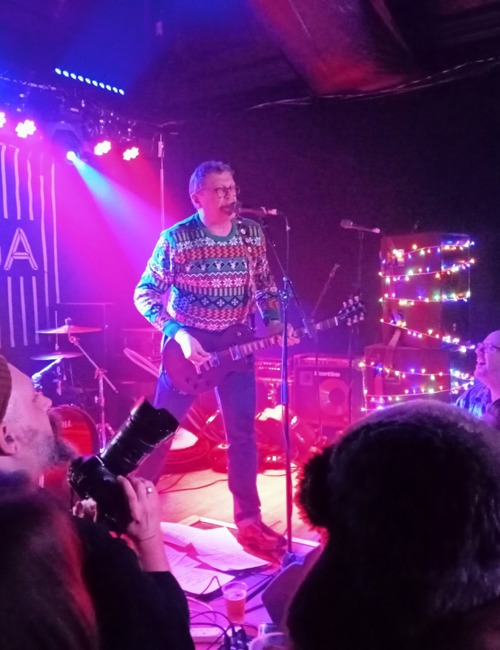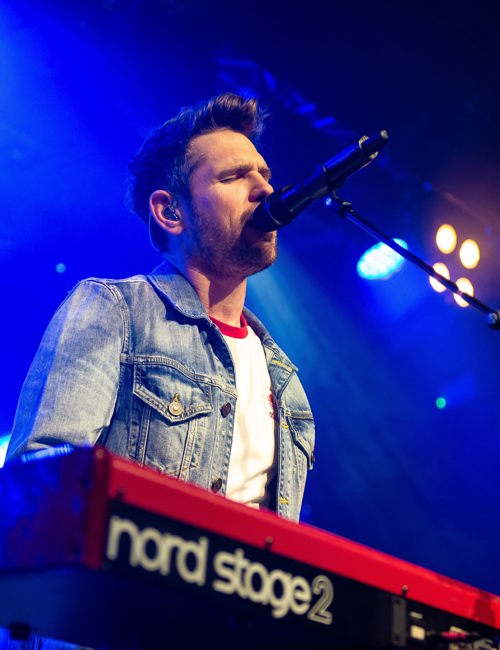Released in three separate parts (Pain, Escapism and Absolution), Cappo’s latest album Canon represents a leap forward in the maturity of his lyrical, literature-infused Hip Hop music. We speak to him about the process of creating the record with producer Kong The Artisan, his recently-completed PhD at Nottingham Trent University, and his collaborations with familiar Notts musicians and poets…

Tell us about Canon. What does this new work mean to you?
Personally, Canon symbolises my reaching a new level of artistic maturity. I can confidently say it’s my most technically accomplished and cohesive work to date. From when I first started working on Canon, I wanted it to tell a story about life in the Midlands. I think I have achieved that, even if much of the story is told from a somewhat narrow cultural and social perspective.
Canon is also a deeply personal record, covering themes such as mental health decline, the long-term effects of grief and trauma, my experiences of various forms of addiction, and how I have come to understand the concept of masculinity in the modern world, especially in relation to how I have chosen to raise my children. Above all, I wanted to make an album that really felt like Nottingham. I wanted it to celebrate the Nottingham scene through the art form of rap.
You’ve decided to release Canon in three parts. What made you want to release it like that?
I can’t claim any specific responsibility for that idea, although I did carry a long-term goal of making Canon’s promotion campaign a ‘slow burner’, in order to help increase its chances of being heard in today’s fast-paced music industry. The decision to release the LP in three parts, or ‘chapters’, was mainly down to Kong The Artisan, the musical producer of Canon.
His decision was mainly based on the lyrical and writerly properties contained in the album (the title alludes to ideas revolving around the literary canon, questioning what constitutes a canonical piece of literature), but on the other hand, I think he saw a theme or pattern starting to emerge early on in the projects development that related to three distinct topics.
These themes were my articulations of pain and latent trauma (Pain), my attempts to escape these issues through music/art (Escapism), and finally, my eventual acceptance of these issues as a part of my own life-long struggle, and coming to terms with them (Absolution).
There’s a few other familiar Notts musicians on the album, like Midnyte, Juga-Naut, Vandal Savage and Liam Bailey. Can you tell us a bit about each of their contributions?
Canon reflects a new maturity in my approach to making music and part of this maturity is marked by my appreciation of a concept called the ‘abundance mentality’. My take on this concept is that life itself is a deeply social experience, and when you realise that your goal in life is not to achieve sole recognition, or individual gain, you open yourself up to so much more opportunity in relation to collaboration, group-thinking, peace of mind, and quality of life.
My new appreciation of this concept led to my wanting Canon to be a collaborative project. It had to involve other characters, other voices, who could help broaden and strengthen its message. The first guest you hear is my long-term friend and musical affiliate, Midnyte Precise, who speaks at the conclusion of Pain. Mid's ability to narrate intricately crafted verses has long been proven throughout his career, but for the Canon project, I wanted to try and capture his maturity and understanding of the human condition in another light, one less reliant on his rhyme skills, and more focused on the conversational gems he often provides us with during everyday interactions. So, after playing him the track, and letting him soak up the vibe, I asked him to speak, openly and honestly, about his feelings on the topics raised in my lyrics. The results were incredibly powerful.
It was an intention from the start of the Canon journey that I work with Juga-Naut and Vandal Savage, and when I first heard the instrumental for Midz, I could clearly hear them both on it. I've been collaborating with them for over a decade, and during that time, we have developed a special bond.
A highlight of Canon’s recording process was witnessing Liam Bailey record his vocals for Early. I learned so much from watching him deliver his takes. Having him sing on two songs for Canon was a real blessing.
Another highlight was watching the great Scorzayzee record his verse on Difference. He really summed up the whole idea of the concept of abundance mentality in his verse when I heard him say: “I’ve got more to give right now than I’ve got to gain.” That’s how I view life nowadays, as more of a process of giving and sharing, and collaboration.
You’ve also got contributions from local poets Ramisha Rafique and io. What do they bring to the record?
Canon is a project that attempts to bridge the gap between literature and music, so I wanted to bring in aspects of poetry, more specifically poetic performance to the music, in order to demonstrate how using different literary mediums can enhance meaning.
One of my closest friends in the poetry world is Ramisha Rafique, a poet, travel writer, and postgraduate researcher at Nottingham Trent University. We’ve known each other since the beginnings of our academic careers, and we share a common appreciation of Hip Hop. I asked her if she had any material she could contribute to Book of Photos that might resonate with themes such as memory, temporality, and how our imagined past. Ramisha sent me a recording of Museé de l’absence, a beautiful piece that really chimed with the track. It was Song of the Week on BBC 6’s Huey Morgan show recently, an achievement I’m really proud of.
Another local poet, io, was kind enough to write a specific piece for Early. Her words really help locate the song deeply in Nottingham, as she identifies landmarks and locations during her performance.
You’ve released Canon on Noel & Poland records. How did you hook up with that label?
Around a year-and-a-half ago, I was contacted by Kong The Artisan, who explained he was building a boutique record company from his headquarters in Hong Kong. He told me that his label, Noel & Poland Records, held the aim of championing underground rap artists, especially those artists from the UK who have remained prolific, and above all, relevant. Kong sent me some demo versions of his musical production, and as soon as I heard this material, I started to think of lyrics, or concepts for songs.
You’ve been signed to a few labels in your career as well as self-releasing bits of material here and there. In this day and age what are the benefits of working with a label like them compared to releasing your music by yourself?
Speaking in terms of my most recent venture with Noel & Poland Records, I think the main benefit I get from working with a record label is being able to share the workload of releasing a full-length project, especially those aspects of the project I would deem as less creatively led. Having someone like Kong to speak to and share ideas about the release has been invaluable for me. During our time working together on Canon, I’ve come to trust in his vision for the project. Over the past few years I’ve come to realise the music that I have taken time to craft and curate deserves to be promoted properly.
It's twenty years since your debut LP Spaz The World. If you could pass on some words of wisdom to the young Cappo of 2003 what would you say?
That’s a great question! And it’s a concept I’d like to address on a future project. I have an idea for a song in which I sample extracts from an acapella version of one of my earliest releases (First Knight, or The Cap Tape) from circa ‘98, and attempt to manipulate it so it plays as if I’m collaborating with an earlier version of myself. I think this idea links with how Kendrick Lamar posthumously manipulated Tupac’s voice at the end of To Pimp A Butterfly, in order for it to seem as if he was in conversation with the late rap artist.
If I could pass on any words of wisdom to my younger self, I would say this: "The moments that will hurt the most are the times that involve you giving in, or quitting on your dream.” There are several moments in my musical career when I feel that I gave in, or gave up, instead of pushing through, and retaining belief. These are the times I most regret. I wish I had been more resilient, and capable of believing in the value of my work in the way that I do now. But hindsight is a wonderful thing. Having said this, I do believe that a lot of events happen for a reason, and I’m very grateful for where life has taken me. I recently heard the gifted local poet and songwriter Daudi Matsiko perform a song I Am Grateful For My Friends that sums it up.
You’ve recently completed a PhD at Nottingham Trent University entitled Nothing New Under The Sun. What made you want to do that?
The main reason I undertook the PhD was to discover more about my own practice in relation to rap music. For nearly twenty years I’d been fascinated with how rap artists draw power from each other’s words, techniques, and performances, in order to apply this power to their own work. I often engaged in this but I was unaware of what this technique was called, or what its place was in Hip Hop culture. As it turns out, it’s called intertextuality, a literary term coined by the semiologist Julia Kristeva in the sixties. I was able to produce a trilogy of LPs that served as the culmination of my thesis, and I’m very excited to release them throughout this summer.
The PhD includes detailed analysis of the lyrics of Nas and Kendrick Lamar, among others. What is it that you find particularly interesting about those artists and their lyrics?
It’s the way that these artists have negotiated a traditionally hypermasculine artform such as rap, and used it to express their personal feelings, vulnerabilities, and flaws. In doing so, they have paved the way for future generations to do the same, with more creative freedom than ever. Not only that, but artists like Nas and Lamar have pushed the envelope of the genre regarding poetic techniques, too.
You’ve been recording at Can’t Stop Won’t Stop with our neighbour Joe Buhdha. Is that for Canon or for something else?
Well spotted! Me and Joe Buhdha are working on a project, which I hope will turn out to be another full-length work. Joe has been a long-term mentor of mine, and we have shared a solid musical relationship over the years. He recently asked me to come to the studio, to vibe and listen to some instrumentals. When I got there, I was amazed by the material he played me. He had an abundance of really special tracks that I immediately responded to. The tracks aren’t Canon-related, but they are being penned in a similar fashion - they are being written to demonstrate my artistic maturity, and how I am utilising rap as a platform for my intellectual curiosity.
The music industry and its financial model has changed drastically since you first started. What do you do to pay the bills when you’re not making music?
That is a question that I’ve tried to answer many times in my lyrics during the making of Canon! For the past five years, I’ve been lecturing on-and-off with Nottingham Trent University and De Montfort University on behalf of the English, Creative Writing, and Media Departments. I’ve also worked with Nottingham College, teaching Creative Writing to the community. This has helped supplement my career in music, and given me an insight into how best I can share the knowledge I’ve accumulated over the years.
Since completing my PhD, I’ve managed to land a role with Confetti, where I teach university students about music performance, and aspects of the music industry such as popular music history, and marketing and branding techniques. I have also been lucky enough to lead the Performance Practice module of Confetti Music’s inaugural Masters programme. I’m a huge believer in the continued learning process, and I feel like I learn something new every day in my work.
How has being a father influenced your music and your music career?
Fatherhood has been a recurring subject in my lyrics for the past fifteen years. Both of my children have become a muse for my writing at some point in their lives! One of the songs I’m most proud of on Canon is Firstborn, about the paternal bond I share with my son. Reflecting on my own upbringing, I can see clearly that growing up without a regular father figure in my life has had various implications on my personal and professional progression. I feel blessed that I am able to be a continued presence in my children’s lives, and to watch them grow up.
Another theme in your work is the working class male experience. What does that mean to you?
In all honesty, whilst I’ve studied literature, music, and aspects of popular culture for nearly a decade, I’m really only just recently starting to realise the implications of class in this country, how it affects me, and us all. I have written a song recently in which I attempt to sum up my feelings on this matter. Below are the initial lines:
Product of the place I was born, there’s no escaping,
Hear it in my voice, and tell it from the way I speak.
Forever stuck here, I know this in my heart of hearts
Nothing will change, and so my symphony is bittersweet.
But such is life, I’m making ends meet
I’ll be a slave to money ‘til I fall and meet up with my maker
Keeping hopes up and alive through these written words,
I’m moving to that rhythm of love, like Anita Baker.
What advice would you give to musicians beginning their careers in this day and age?
Above all, value your work, and value yourself. Take your time developing your craft, and love the process. Speak about the things that move you, and believe in what you say. The rest will follow. Above all, don’t feel as if you have to be constantly present online as an artist. To quote David Joseph, Universal Music Group’s current CEO, allow yourself the space to be ‘occasionally brilliant’.
What’s coming up next for you?
I’m really excited to say that the launch party for the Canon LP will take place at Rough Trade Nottingham on Friday 12 January. This promises to be a one-off event, with special guests Kong The Artisan (a DMC champion on the turntables!), Liam Bailey, Juga-Naut, Vandal Savage, and Midnyte and Rukus Regardless all gracing the stage during the night. I’ve also enlisted the help of an extremely gifted Masters degree student at Confetti, Supreme Eteng Eteng, to play acoustic versions of the more piano-based songs on the album. I would love for writers, poets, performers, artists, and musicians of all kinds to join us for the event. I want it to be a celebration of Nottingham City and its thriving creative scenes.
As noted earlier, my next musical project will be another significant one for me. Over the next year I will be releasing a trilogy of LPs that form the creative component of my PhD thesis. The project is unapologetic in its intellectual associations, and will be accompanied by a book of transcribed lyrics for the albums, with fully glossed footnotes detailing every intertextual and allusive technique employed throughout the project. After this, me and Kong plan on going back to the studio to build Canon II.
Anything else you’d like to say?
Thank you, LeftLion for giving me the opportunity to promote my new work. You have always allowed me to share my artistic viewpoints through your pages. I greatly appreciate it. And thank you to all the people who have supported Canon, and my previous music releases over the past 25 years. I look forward to celebrating the Notts arts scenes with you soon!
Canon is out now and available to buy at noelpolandrecords.com
We have a favour to ask
LeftLion is Nottingham’s meeting point for information about what’s going on in our city, from the established organisations to the grassroots. We want to keep what we do free to all to access, but increasingly we are relying on revenue from our readers to continue. Can you spare a few quid each month to support us?




